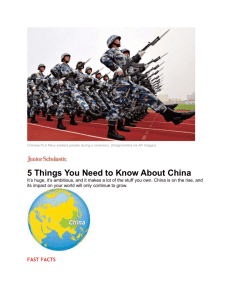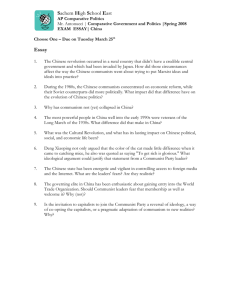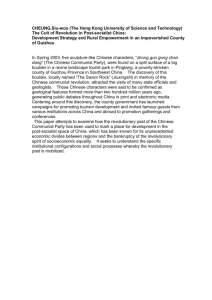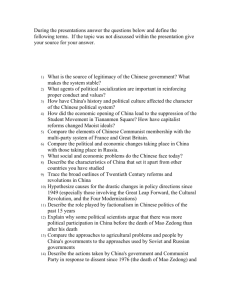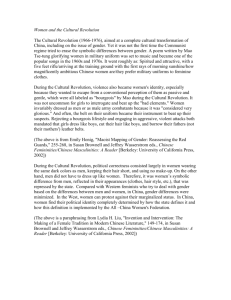Document
advertisement
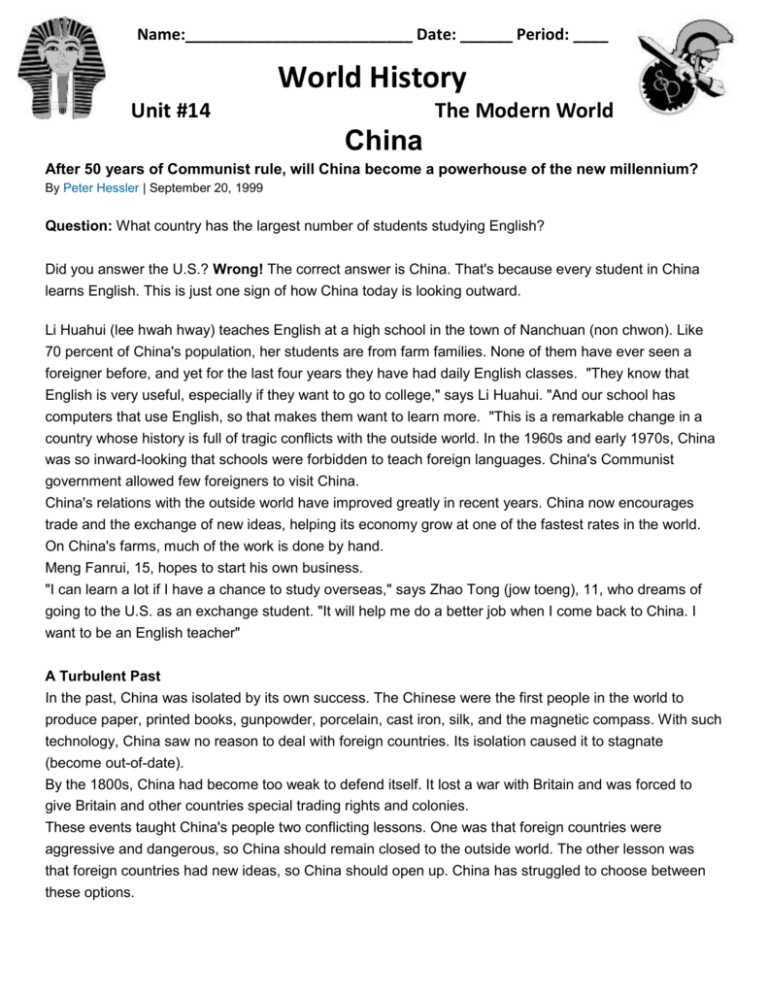
Name:__________________________ Date: ______ Period: ____ World History Unit #14 The Modern World China After 50 years of Communist rule, will China become a powerhouse of the new millennium? By Peter Hessler | September 20, 1999 Question: What country has the largest number of students studying English? Did you answer the U.S.? Wrong! The correct answer is China. That's because every student in China learns English. This is just one sign of how China today is looking outward. Li Huahui (lee hwah hway) teaches English at a high school in the town of Nanchuan (non chwon). Like 70 percent of China's population, her students are from farm families. None of them have ever seen a foreigner before, and yet for the last four years they have had daily English classes. "They know that English is very useful, especially if they want to go to college," says Li Huahui. "And our school has computers that use English, so that makes them want to learn more. "This is a remarkable change in a country whose history is full of tragic conflicts with the outside world. In the 1960s and early 1970s, China was so inward-looking that schools were forbidden to teach foreign languages. China's Communist government allowed few foreigners to visit China. China's relations with the outside world have improved greatly in recent years. China now encourages trade and the exchange of new ideas, helping its economy grow at one of the fastest rates in the world. On China's farms, much of the work is done by hand. Meng Fanrui, 15, hopes to start his own business. "I can learn a lot if I have a chance to study overseas," says Zhao Tong (jow toeng), 11, who dreams of going to the U.S. as an exchange student. "It will help me do a better job when I come back to China. I want to be an English teacher" A Turbulent Past In the past, China was isolated by its own success. The Chinese were the first people in the world to produce paper, printed books, gunpowder, porcelain, cast iron, silk, and the magnetic compass. With such technology, China saw no reason to deal with foreign countries. Its isolation caused it to stagnate (become out-of-date). By the 1800s, China had become too weak to defend itself. It lost a war with Britain and was forced to give Britain and other countries special trading rights and colonies. These events taught China's people two conflicting lessons. One was that foreign countries were aggressive and dangerous, so China should remain closed to the outside world. The other lesson was that foreign countries had new ideas, so China should open up. China has struggled to choose between these options. Communists Take Power In 1949, a Communist revolution took power in China (see timeline). The Communists seized total control of the government and all businesses. They were led by Mao Zedong (mah-oh dzeh-doong), who saw foreign countries as dangerous. He closed China to the outside world and became a dictator who could not be criticized. Mao started a number of disastrous policies that led to the death or imprisonment of millions of Chinese. One of his worst programs was the Cultural Revolution. Begun in 1966, this movement turned China upside down for 10 years. People were told to destroy everything traditional-especially anything from the U.S. and other Western countries. Children were told to criticize their teachers instead of studying. Thousands of intellectuals were imprisoned, and many died. "At that time, we didn't study anything in school," says Zhao Tong's father. "Teachers wanted to teach, but students wouldn't listen." China's Rebirth The Cultural Revolution ended after Mao Zedong died in 1976. The Chinese economy was in shambles, and most of the population was uneducated. But a new generation of Chinese leaders began to open up to the outside world. Starting in the early 1980s, the country's economy grew at an amazing pace. "I was 25 years old when I first saw a color television," says Zhao Tong's father. "My daughter saw it as soon as she was born, and now we even have a computer. There are so many changes like that." More and more, the U.S. and other industrialized countries are setting up factories and businesses in China. The label "Made in China" can be found in the U.S. on products ranging from clothes to electronics to toys. The jobs created by that production has lifted millions of Chinese out of poverty-especially in the cities. Zhao Tong's family is part of China's rising middle class. Ten years ago, the average city resident made only $166 a year; today, the figure has risen to $659. Many urban Chinese can buy luxury goods like computers, cellular phones, and VCRs. Like almost all city-dwellers, the Zhao family has only one child. One of China's biggest problems is overpopulation. With 1.2 billion people, the country is the most populous on earth. China has one-fifth of the world's population, but only 7 percent of the world's agricultural land. As a result, the government enforces a law that limits most families to one child. Trouble with the U.S. Although China's foreign relations have improved greatly, there are still problems-especially with the U.S. Last May, U.S. planes attacking Yugoslavia bombed the Chinese embassy in Belgrade. The U.S. said that the bombing was an accident. But China's government-and most Chinese-saw the bombings as another example of deliberate foreign aggression. On the other hand, the U.S. is unhappy with China's human-rights record. China is still controlled by the Communist Party, which does not allow opposition parties or a free press. Chinese people who criticize the government often end up in prison. Most Chinese agree that further political reforms are still needed. But they believe that their country is headed in the right direction, especially now that people are free to start up their own businesses. For many, economic freedom is more important than political freedom. China's troubled past has left many people hungry for stability. "I Want Freedom" If you talk with a Chinese teenager, you will see that the U.S. and China have much in common. Meng Fanrui (mung fahn ray) 15, enjoys computers, electronic games, basketball, and in-line skating. Even when he speaks Chinese, Meng Fanrui uses some English expressions, like "OK" and "good-bye". Like U.S. teenagers, Meng Fanrui longs for freedom and independence. "I want to start my own restaurant, or car-repair shop, or barbershop-any kind of business," he says, when asked about the future. "I want something where I can rely on myself, because I want freedom." Facts to Know AREA: 3,601,312 square miles (about the size of the U.S.). POPULATION: 1.2 billion, world's largest. POPULATION UNDER 15: 26% GOVERNMENT: One-party Communist government led by President Jiang Zemin. ECONOMY: World's third largest economy. Leading industries: iron and steel, textiles, machines, and weapons. Minerals: coal, oil, iron ore, tungsten, others. Major crops: cotton, rice, tea, wheat. *PER-CAPITA GDP: $2,800 LIFE EXPECTANCY: 69 years, men; 73 years, women Tibet Three Gorges Dam China Try to answer the following questions about China. 1. Every student in China learns _______________________. 2. In the 1960s and early 1970s, Chinese schools were forbidden to teach ________________________. 3. In the 1800s, lost a war with Britain and was forced to give Britain and other countries ___________________________________. 4. The Communist Revolution was led by _________________________________. 5. One of Mao’s worst programs was the ___________________________________________. 6. The Cultural Revolution ended after Mao Zedong __________________. 7. A new generation of Chinese leaders began to open up to ___________________________________. 8. One of China's biggest problems is _________________________________________. 9. For many, __________________ freedom is more important than ___________________ freedom. 10. Like U.S. teenagers, Meng Fanrui longs for freedom and _____________________________. 11. What former mountain nation did China take by force in 1950? 12. What manufacturing center lies near Hong Kong and Macau? 13. Which two countries border China to its east? 14 Which region of China is least likely to be densely populated-the north, south, east, or west? 15. What colony did China take from Portugal? 16. Many people must move because of a gigantic construction project at 31º N, 111º E. What is it? 17. What city is located at approximately 30º N, 91º E? 18. Anti-Communists rule what nearby island nation? 19. What river flows into the East China Sea? 20. What is the distance in miles between Beijing and Nanjing?
